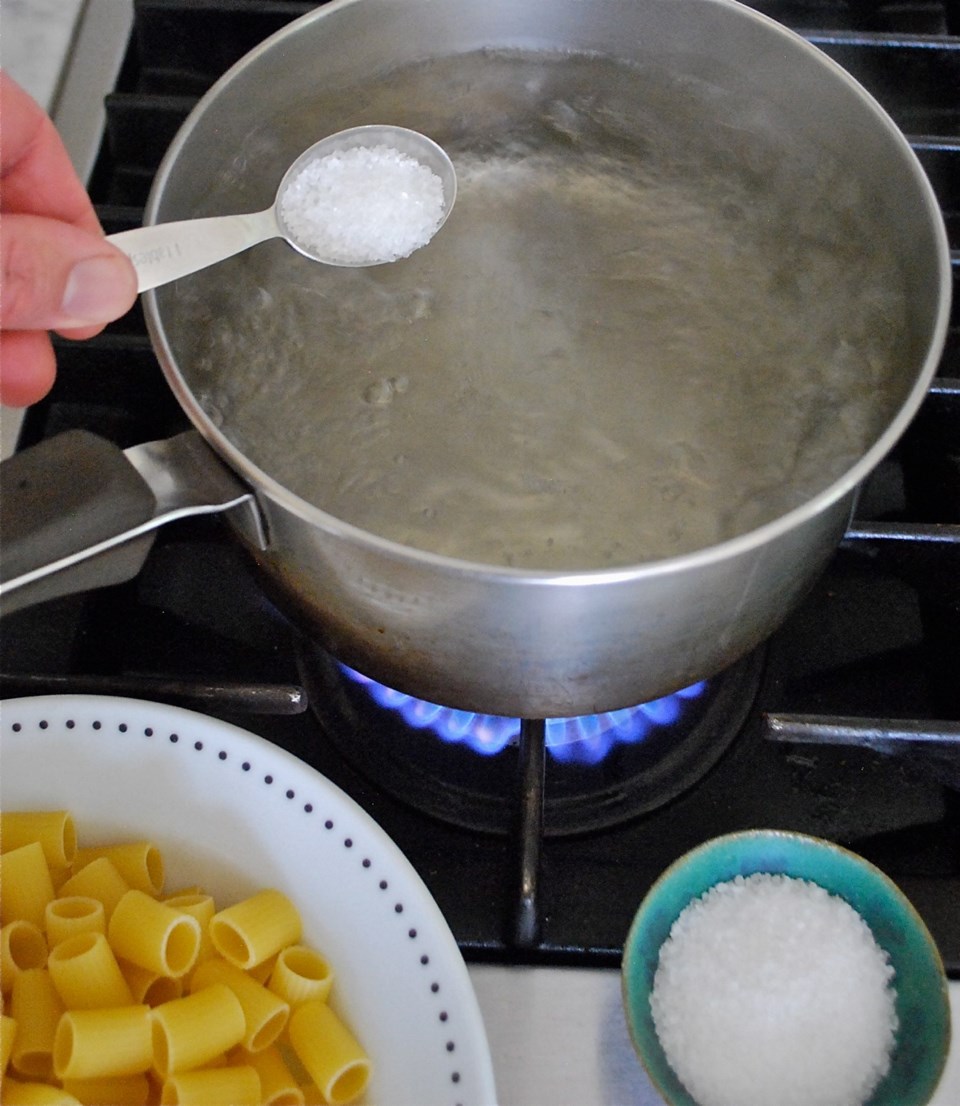A reader, Joe, sent me an email and said when he was growing up in England his mother always added a teaspoon or so of salt to the water used to boil potatoes and other vegetables.
He added that his wife, Linda, and he have not continued this practice, saying they’ve no doubt been influenced by the low-salt-diet advice of recent years. Joe added that they also don’t add salt when boiling pasta.
In either case, whether cooking potatoes or pasta, he says they’ve not noticed any taste deficiencies. And then Joe asked me: is there still any reason to add salt to the cooking water?
My first thought was that Linda and he had been cooking those foods in that salt-free way for so long they’ve just gotten used to the taste. Culinary aficionados and even scientists say those foods are not reaching their flavour potential because of that decision.
In an article related to this topic at thoughtco.com, Anne Marie Helmenstine, a science educator with a Ph.D. in biomedical sciences, says adding salt to water adds flavour to the water, which is absorbed by the food. She says salt enhances the ability of chemoreceptors in the tongue to detect molecules that are perceived through the sense of taste.
In one of my favourite culinary guidebooks, The Elements of Cooking, author Michael Ruhlman says salt is arguably the most important and powerful ingredient in the kitchen.
He adds that many chefs consider the ability to use salt well to be the most important skill a cook can have.
Ruhlman says when salting cooking water for such things as grains, pastas and legumes, to taste the water after you have salted it, and realize that, that’s about how salted the finished food will be. The same would be true when salting the water you’ll boil potatoes in.
In an article at today.com, cooking show host, best-selling cookbook author, restaurateur and Italian food expert, Lidia Bastianich, provides another description of what the water should be like when cooking pasta. She says it should be salted to the point that it tastes almost like seawater.
Bastianich added that if you don’t salt the water, the pasta will taste flat. And that adding salt to the sauce at the end of cooking will not correct the balance that salted water gives to pasta.
I could provide many more examples of regarded chefs imploring that you do salt the cooking water for the reasons noted above. But most of them do recognize that some people, for health reasons, must reduced their salt intake.
According to Health Canada, sodium is an essential nutrient found in salt and many foods. That government agency says our bodies need a small amount of sodium to be healthy, but too much can lead to such things as high blood pressure, a major risk factor for stroke, heart disease and kidney disease.
But culinary sages say that, rather than sacrifice the use of even a modest amount of salt in your kitchen, where you control the amount used, the focus should be on reducing sodium intake by limiting the consumption of processed foods.
On that note, according to the Canadian Heart and Stroke Foundation website, heartandstroke.ca, about 80 per cent of the salt we consume comes from those kinds of foods, including fast foods, prepared meals, processed meats, canned soup, snack foods and bottled or packaged dressings, sauces and condiments.
Switching back to cooking pasta, in research done by Cook’s Illustrated (cooksillustrated.com) on how much sodium does salted cooking water add to it, they sent samples of six different types, from skinny linguini to stubby rigatoni, to an independent lab for analysis.
Each 454-gram (one-pound) sample of pasta was cooked in about three and three quarter litres of water that had one tablespoon of table salt in it. When the results came back they showed that, give or take a few milligrams, all the pastas had absorbed about the same amount of salt, around 1/16 teaspoon per 113-gram (quarter-pound) serving.
1/16 teaspoon of salt has about 145 milligrams of sodium, but if that was too much for you, I think you could add half as much and still lift up the taste of the pasta. Just to provide a comparison to that salted pasta, a McDonald’s Big Mac contains 950 milligrams of sodium.
Just so you know, Health Canada says, ideally, adults 14 to 50 years of age should consume around 1500 milligrams of sodium per day, those 51 to 70 years, around 1300, and those over 70 years, 1200.
Different foods cooked in salted water, such as potatoes, will, of course, absorb it differently. But the bottom line is only a fraction of that one teaspoon of salt Joe’s mother added to the potatoes, which served a family, would have been absorbed by them.
But in the end, Joe, it really does come down to personal preference. If you feel the foods you’ve being cooking in salt-free water taste fine, and/or you or your doctor is concerned about your sodium intake, keep doing what you doing. If you’re in a restaurant, though, having mashed potatoes or pasta and are wondering why they taste so full and robust, it’s because the chef added salt to the cooking water.
Eric Akis is the author of eight cookbooks. His columns appear in the Life section Wednesday and Sunday.



